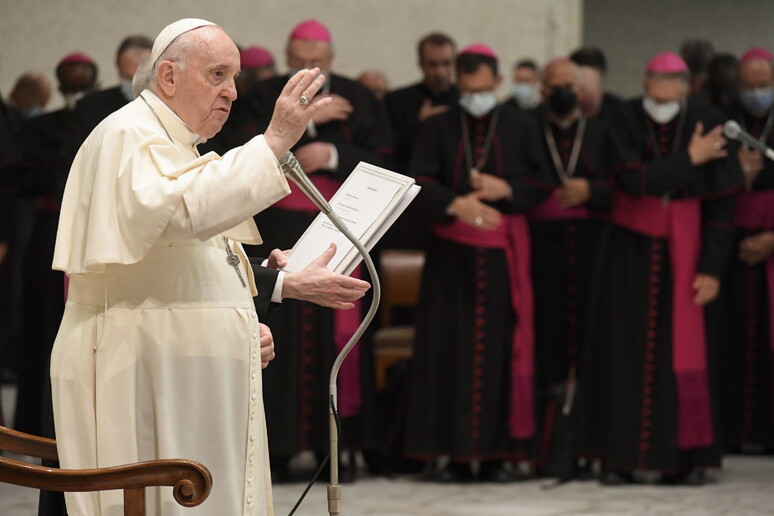Pope Francis on Thursday reiterated a
call for urgent action on the climate crisis saying that life on
Earth is threatened.
In the presence of Patriarch Bartholomew I and Audrey Azoulay,
Director of UNESCO, Francis said that as next month's COP26
conference draws nearer there is the awareness that "the harm we
are doing to the planet is no longer limited to climate damage,
water and soil, but now threatens life itself on earth,"
according to Vatican News.
In the face of this, he underlined, "it is not enough to repeat
statements of principle that make us feel good." No, he added,
"the complexity of the ecological crisis, in fact, demands
responsibility, concreteness and competence."
Speaking on Thursday morning at Rome's Pontifical Lateran
University, he recalled the "Faith and Science" event, which
took place in the Vatican this week and included the
participation of scientists and representatives of different
religions. He was struck, he revealed, by the words of one of
the scientists who said, "My granddaughter, who was born last
month, will have to live in an uninhabitable world if we don't
change things".
Speaking in this place of learning, the Pope harked back to the
original mission of 'Universitas', "where students and faculty
come together to reflect and creatively work out new ways
forward. "The effort to form ecological consciousness and
develop research to protect the common home passes through the
Universities," Pope Francis said.
Continuing on this point, the Pope underlined that "Academic
activity is called to foster an integral ecological conversion
in order to preserve the splendor of nature, first of all by
reconstructing the necessary unity between the natural and
social sciences with what is offered by theological,
philosophical and ethical reflection, so as to inspire juridical
norms and a sound economic vision."
During his speech, Pope Francis expressed his thanks to the
United Nations Educational, Scientific and Cultural Organization
(UNESCO), for its "active attention" to this Ecology and
Environment initiative.
It is a path, he said, that will operate together with the
Patriarchate of Constantinople with "an open perspective"
capable of "welcoming the attention of the Christian Churches,
the different religious communities, those who are searching and
those who profess to be non-believers." The cycle of studies,
the Pope stressed, should therefore be a meeting point of
experiences and thoughts, combining them through the method of
scientific research. "The University not only shows itself to be
an expression of the unity of knowledge but also the repository
of an imperative that has no religious, ideological or cultural
boundaries."
Warning that expectations for the 2030 sustainable development
goals are receding, Pope Francis said "there is no ecology
without an adequate anthropology. Without a true integral
ecology, we will have a new imbalance, which will not only fail
to resolve problems but will add new ones."
Therefore, "the idea of a special cycle of studies," the Pope
underlined, "serves to transform even among believers the mere
interest in the environment into a mission carried out by
trained people, the fruit of an adequate educational experience.
This is the greatest responsibility in the face of those who,
because of environmental degradation, are excluded, abandoned,
and forgotten."
He continued by saying, "This is a work to which the Churches,
by vocation, and every person of goodwill are called to make the
necessary contribution, becoming the voice of the voiceless,
rising above partisan interests and not merely complaining."
"Let's abandon the yes it's always been done this way," the Pope
said, "it is suicidal ...". Instead, we are called to do
qualified work, which demands generosity and gratuitousness from
everyone in order to respond to a cultural context whose
challenges await concreteness, precision, and the ability to
confront them." Hence the invitation to "sow beauty and not
pollution and destruction."
At the end of the meeting, the Pope, along with the Patriarch
and the Director of UNESCO, jointly signed the UNESCO Convention
for the new cycle of studies in the "University of the Pope" on
Ecology and Environment.
ALL RIGHTS RESERVED © Copyright ANSA











